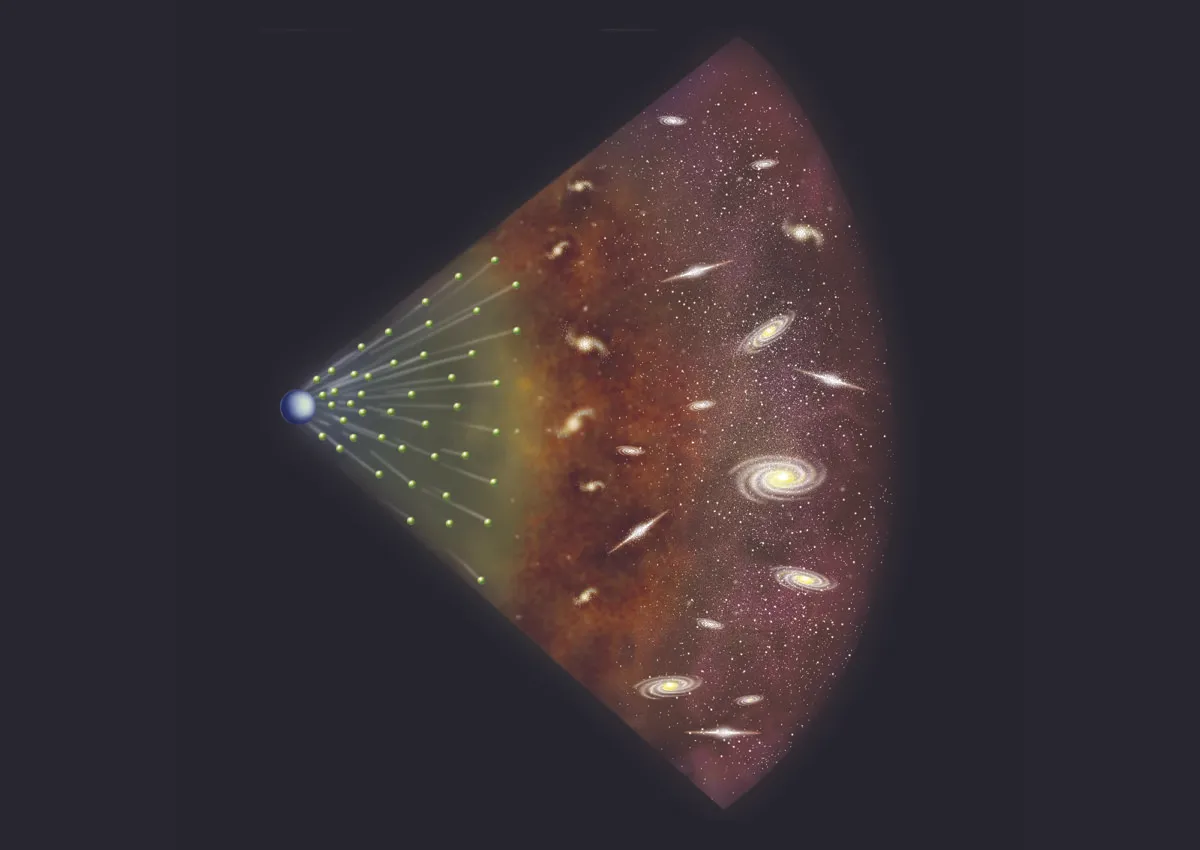The impact of finding life on another planet would be felt across every facet of society, including religion. If there is life elsewhere in the Universe, the possibility that we’ll discover it within the lifetimes of our children is high. In the past 25 years, scientists have built a powerful foundation upon which the search for extraterrestrial life can take place.
While we won’t be able to exchange messages with extraterrestrials anytime soon, by the end of this century we are likely to know if we’re alone or have biological company in our Galaxy. Humanity can make no discovery more profound than that.
Read more about cosmology:
- Did our Sun once have a partner?
- Solar System predictions: what scientists got right and wrong
- Did our Solar System form in a bubble?
The existence or non-existence of extraterrestrial life won’t prove any one theological system right or wrong.
But being able to prove that life exists will have an enormous impact on how each follower of a religion understands their own particular faith.
Perhaps more importantly, knowing that there is intelligent life out there may change the way we treat people of other faiths on this planet.
Let’s start by assuming a single deity controls the entire Universe. If this is the case, are the rules for living according to the principles ordained by God identical on every planet? What of life that begins somewhere and it transported somewhere else, like through panspermia?
Or, to put it another way, would my religion make any sense to an alien?

Most Christians are likely to think that the God they worship is the God of the whole Universe.
The obvious corollary to this assumption is that Christianity can be exported; that extraterrestrials can and perhaps should be converted to Christianity, just as European explorers, centuries ago, sought to convert non-European native peoples to Christianity.
Does baptising extraterrestrials make theological sense? It does to Guy Consolmagno, an American research astronomer and the director of the Vatican Observatory, who has written, “It is not just humankind, but the whole of creation that was transformed and elevated by the existence of Christ.”
If limited by the laws of physics, we’ll be unable to transmit news of the birth of Christ to the rest of the Universe in a reasonable amount of time.
Once we have accepted, through astronomical observations, that life exists beyond Earth, then Consolmagno’s “whole of creation” would include the creatures living on worlds millions of lightyears from our home planet.
This is where things get interesting. Unless you deny the possibility of evolution, the discovery of any kind of life – even bacterial life – on another planet implies that sentient beings either exist or may come into existence in distant parts of the Universe.
If all beings in the Universe are “elevated by the existence of Christ”, we might ask how those otherworldly beings will learn about the birth and resurrection of Jesus that occurred on planet Earth, approximately 2,000 years ago.
Will we send messages to them at the speed of light? Will we transport copies of the gospel in high-speed rockets?
If we’re limited by the laws of physics, we’ll be unable to transmit news of the birth and redemption of Christ to the rest of the Universe in a reasonable amount of time.

Twentieth-century Roman Catholic philosopher and Jesuit priest Pierre Teilhard de Chardin – whose writings, since 1962, have been considered full of “serious errors as to offend Catholic doctrine” – wrote boldly and radically that “The idea of an Earth chosen arbitrarily from countless others as the focus of Redemption is one that I cannot accept.”
The more mainstream Jesuit theologian Karl Rahner echoed this sentiment, saying, “A theologian can hardly say more about this issue than to indicate that Christian revelation has as its goal the salvation of the human race.”
Christianity, in other words, is a religion only for humans on Earth. Were we to discover that extraterrestrials exist, we would have no reason to teach them about Christianity, because Christianity would, theologically speaking, make no sense to them.
But Christianity isn’t the only religion we have on Earth. What about Islam?
The pillars of the Islamic faith require that the faithful face Mecca at times of prayer and undertake a pilgrimage to Mecca in the course of their lifetime.
If aliens live millions of lightyears from Earth and can’t determine the direction of Mecca, let alone travel to it, does that preclude them from being Muslim?
According to the Qur’an, “His are all things in the heavens and on the Earth…His throne doth extend over the heavens and the Earth.”
Therefore, explains Islamic philosopher Seyyed Hossein Nasr, “All beings in the Universe… are Muslim, i.e., ‘surrendered to the Divine Will.’”
But how can one be Muslim if one cannot practise the Islamic faith?

If and when we discover that extraterrestrials exist, the Islamic faithful on Earth might have to acknowledge that intelligent beings on other worlds would have their own prophets, prophets that would reveal to those beings ‘pillars of the faith’ appropriate for their particular worlds.
Much like Islam and Christianity, the practice of Judaism is strongly Earth-centric.
Could a being on another planet be Jewish if it cannot claim Jerusalem as an ancestral home or has no reason to celebrate the festivals of Purim and Passover?
Orthodox Jews believe one must pray three times a day to faithfully practise Judaism.
Is that possible on a planet with a day that lasts only 90 minutes? All of these issues emerge because Judaism is a religion built upon the daily life and culture on planet Earth.
Whether Judaism is limited by its human-centric aspects, however, is a matter for scholarly debate.
The great medieval scholar Moses Maimonides never considered mankind of great importance in God’s larger Universe, but Rabbi Norman Lamm, head of the rabbinic school at Yeshiva University from 1976 until 2013, suggests that mankind can be important to God without being the only created species in the Universe.
“We affirm our faith that God is great enough to be concerned with all his creatures, no matter how varied and how far-flung throughout the remotest galaxies of His majestic Universe… Man may not be the purpose of the Universe, yet he may have a purpose in the Universe.”
Similarly, Judaism may be intended only for humans on Earth, but that doesn’t diminish the importance of the practice of Judaism.

Unlike the three major western Abrahamic religions, Hinduism is not Earth-centric. Hindus could practise anywhere in the Universe, and all beings throughout the Universe could practise Hinduism.
For some Hindus, the Earth may be considered a vital aspect of its cosmological system, but Earth need not be the only sacred location in the Universe.
The connection of humans to life elsewhere in the Universe emerges most directly through the belief in samsara, the endless cycle of birth and rebirth within and between different levels of living beings.
For Hindus, when death occurs, the soul of a living being transitions from one material body to begin a new life in another one.
That reincarnation event can transfer one’s life force from a body on Earth into the body of another living being anywhere in the Universe – the laws of physics don’t control or limit the speed or distance that a soul might transmigrate.
Buddhism, on the other hand, is a way of life devoted to finding a spiritual path for escaping the suffering of endless reincarnation.
Those who follow the path of the Buddha seek to achieve nirvana and end their personal suffering.
Within the Buddhist worldview, the Universe is incomprehensibly vast and ancient, and is densely populated by sentient beings.
In this immense Universe humans, like all forms of life, are simultaneously insignificant and all-important.
In the past, astronomy has undergone significant paradigm shifts that have had major impacts on religion.
Most notably, the Copernican revolution undermined the Aristotelian foundation of medieval Christianity.
Big Bang cosmology, offered up by astronomers in the 20th century, has encountered significant opposition from literal creationists.
Now, in the 21st century, astronomers are charging toward yet another paradigm shattering discovery.
Perhaps the most valuable lesson we can learn from our history is that we can’t run and hide from scientific progress.
If aliens are out there, we are going to find out very soon. The best thing we can do, whatever our faith, is to start considering the implications of that.
David A Weintraub is Professor of Astronomy at Vanderbilt University and the author of the book Religions and Extraterrestrial Life. This article originally appeared in the May 2016 issue of BBC Sky at Night Magazine.